|
|
|
Sort Order |
|
|
|
Items / Page
|
|
|
|
|
|
|
| Srl | Item |
| 1 |
ID:
144463
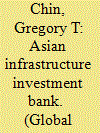

|
|
|
| 2 |
ID:
118660
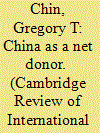

|
|
|
|
|
| Publication |
2012.
|
| Summary/Abstract |
The article examines China's emergence over the past decade as a net donor, and the implications of this status in global development. The analysis begins by outlining China's rise as a net donor, drawing comparisons in two-way aid flows with the other rising states, specifically Brazil, South Africa and India, and then turns to the implications of China's rise as an aid sender. The central argument is that conceptualizing China's rise as a 'net donor' is crucial for understanding the hybrid position that China has come to occupy in the global aid system, and the consequences of this positioning. Although China has achieved remarkable success with its own development, rather than join the Organization for Economic Cooperation and Development's Development Assistance Committee (DAC) regime of traditional donors, the Chinese Communist Party and government leadership has chosen instead to continue to self-identify with the countries of the South, and to construct ties of South-South cooperation outside of DAC arrangements. The Chinese leadership is trying to stake out an unprecedented position in the global aid system, traversing the North-South divide, despite the fact that China has already joined the ranks of world economic powers.
|
|
|
|
|
|
|
|
|
|
|
|
|
|
|
|
| 3 |
ID:
140640
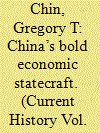

|
|
|
|
|
| Summary/Abstract |
China’s global profile is changing dramatically. An active member of the United Nations and the Bretton Woods organizations (the International Monetary Fund and the World Bank) since the mid-1970s, Beijing is now building new multilateral financial institutions where it sits at the center of the table, making rules and setting standards. After the two decades from the 1980s to the early 2000s, when it aspired mainly to integrate into the existing international economic institutions, China has transformed into an increasingly confident global actor, keen to capitalize on its accumulated resources and experience, and looking to assert itself more prominently in the world economy.
|
|
|
|
|
|
|
|
|
|
|
|
|
|
|
|
| 4 |
ID:
103982


|
|
|
|
|
| Publication |
2011.
|
| Summary/Abstract |
This article details the reorganization of China's national leadership training system, and analyses the reforms as an integral element of the Chinese Communist Party's efforts to adapt institutionally to a rapidly changing environment. Three main findings are presented. First, the national leadership training system is being remade under the direction of the Party's Central Organization Department to give greater emphasis to the "spirit of reform and innovation," as seen especially in the creation of the China Executive Leadership Academy in Pudong, Shanghai, and in the formation of sister academies in Jinggangshan and Yan'an. Second, China's political elite have given greater priority to leadership innovation, although they are trying to balance this with ensuring that sufficient attention and resources are also given to preserving the ruling status of the CCP. Third, by establishing the new group of training academies under the COD, the Party is diversifying beyond the Party School system for leadership research and training. The article suggests that the guiding logic behind these reforms is to promote enough innovation in managerial training and research to enable the Party to meet the changing governance requirements of the market transition and economic globalization, while at the same time putting in place institutional measures that help to preserve the Party's rule.
|
|
|
|
|
|
|
|
|
|
|
|
|
|
|
|
| 5 |
ID:
096250


|
|
|
|
|
| Publication |
2010.
|
| Summary/Abstract |
This article examines the interaction between the emerging and traditional powers in global governance reform, and asks whether we are heading towards an international financial system that is more fragmented, where power is more diffused and national and regional arrangements play a more prominent role, at the expense of global multilateral institutions. It begins with a brief discussion of the global systemic and country-specific factors that motivate Brazil, China and other emerging countries to accumulate large currency reserves. We find that national arrangements for managing financial and currency crises will continue to hold sway for emerging countries in the wake of the global crisis. However, the actual capacity of regional arrangements in managing future financial crises is uncertain, and the significance of regional alternatives in the emerging architecture should not be overstated. The real capacity of East Asian regional arrangements to manage financial crises, payments problems or currency attacks is still untested, and key thresholds in multilateralization still lie ahead. In South America, multilateral lender-of-last-resort support inside the region is largely confined to the sub-regional level and is limited by Brazil's reticence. Enduring reliance on bilateral measures for financial crisis management is noted. Where there has been progress in regional solutions, since the global crisis, has been in the role of regional development banks in providing financing for developing countries to enact counter-cyclical policies. Such support also provides insulation for states in the region against the contagion effects of international financial crisis. We are in the midst of transitioning to a more diverse and multi-tiered global financial and monetary system. A reformed IMF could have a role to play in addressing global imbalances and encouraging a shift from national reserves to collective insurance, however, it would be preconditioned by significant shifts in the policy, lending operations, and internal governance of the Fund, and willingness among the G20 to strike a new consensus on how to deal with imbalances, and new accommodation on acceptable reserve levels.
|
|
|
|
|
|
|
|
|
|
|
|
|
|
|
|
| 6 |
ID:
161612
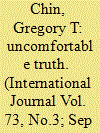

|
|
|
|
|
| Summary/Abstract |
This article examines the behavioural patterns of successive Canadian governments in responding to three takeover attempts of iconic high-value Canadian corporates by large state companies from China. The first is China Minmetals Corporation’s attempt to acquire Noranda in 2004–2005 during the Liberal government of Paul Martin, the second is China National Offshore Oil Corporation’s acquisition of Nexen in 2012 during the Conservative government of Stephen Harper, and the third is China Communications Construction Corporation International’s bid for Aecon Group in 2017–2018. This analysis highlights some important similarities in the behavioural response of the Canadian governments across the three cases: ambivalence and wariness. Policy lessons are addressed in the conclusion.
|
|
|
|
|
|
|
|
|
|
|
|
|
|
|
|
| 7 |
ID:
177648
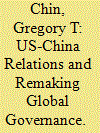

|
|
|
|
|
| Summary/Abstract |
In this article I examine the emerging crisis in major institutions of global governance, and the ways that US-China relations play crucially in the crisis and its potential resolution.
The mix of competition and cooperation in the US-China relationship during the Obama presidency resulted in progress
as well as stalemate in global governance, while the subsequent degeneration of relations during the Trump presidency has brought about crisis situations in major international
organizations, a critical change-point in global governance.
But the change is ambiguous; it can result either in organizational collapse or the pursuit of a fundamentally transformative outcome.
|
|
|
|
|
|
|
|
|
|
|
|
|
|
|
|
|
|
|
|
|